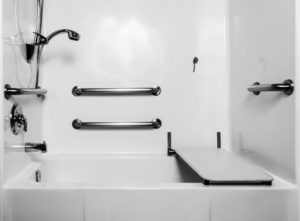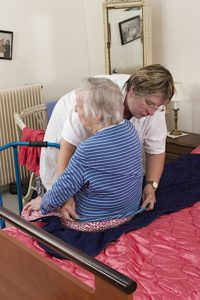Each year, thousands of elderly people experience falls with more than half resulting in injuries. The high risk of serious injury and even death make teaching fall prevention vital to their well-being. Mobility problems, along with vision and balance issues, are often blamed for the high statistics. While these all contribute to the overall numbers, there are some overlooked risks that often add to the problem. Below are some tips to help you avoid a life-altering fall when you least expect it.
1. Look Out for the Grandkids’ Toys
Little ones love to play in the floor and they often leave their toys behind when they’re finished. Even a small toy that you don’t see can get underfoot and cause you to fall. The same is true of pets and their toys. An enthused pet doesn’t know he’s getting in your way when walking underfoot.
2. Don’t Polish the Floors
Hardwood and tile floors only take a little water to turn into a walking hazard. Dementia patients and seniors with failing vision can also have trouble seeing their pathway clearly. Think twice before putting wax or polish on the floor that only add to the problem.
3. Leave a Wide Walking Space
Furniture that’s too close together presents a hazard when it keeps you from walking straight through your home. Vision problems or walking in the dark make it even easier to fall over small pieces of furniture or trip over the corners. Keep everything including electrical cords out of your path.
4. Turn Your Shower Into a Safety Zone
Showering is an activity that most of us take for granted. We jump in and out of the shower in a matter of minutes, ready to start our day. Seniors with balance and/or mobility problems don’t have the same luxury. The bathroom is the most dangerous place in the home for seniors. Just stepping in and out can be a challenge. When falls in the bathroom occur, there is a big chance that they will strike the sides of the tub or the hard tile floor. Taking steps toward fall prevention is more important in the bathroom than any room in the house.
To make your shower a safer place, add the appropriate rails seats to the tub to make getting in and out more secure. The same is true for the toilet. Many seniors fall while getting on and off the seat. Use non-skid bath mats in the floor that stay in place even when wet. You may also want to look into buying a walk-in tub that lets you just walk in instead of stepping over the side of the tub.
5. Be Aware of Medication Side-Effects
Many of the medications seniors take cause dizziness as a side-effect. Ask your doctor what to expect from any of your medications. If you drive, getting dizzy puts you in danger on the road, too. If your medications cause dizziness, look for strategies to prevent them from increasing your risk of falling.
6. Make Sure Your Chair Is Secure Before You Sit
Misjudging the distance that your seat is behind you can cause you to miss it completely. Reach behind you and find it before you sit down. Even if you’re at home and sitting in the same chair you use every day; don’t leave its position to chance.
7. Stand Up Slowly
Standing quickly allows a lot of your blood to rush downward, sometimes causing you to feel lightheaded and even faint. Stand up slowly and take the time to regain your balance before you begin to walk.
8. Sit on a Chair to Get Dressed
Most of us sit on the edge of the bed when changing clothes or putting on socks and shoes. But if your bed is mobile or doesn’t have a heavy enough frame and/or mattress, the bed might scoot in response to your weight. Sit in a firm chair instead.
9. Put Items You Use Often at Eye Level
Leave the lower drawers and top shelves to store things you rarely if ever use. Keeping those you use frequently within easy reach will keep you from having to lean over or climb a step ladder.
Steps to Prevent Falls for Your Loved One
Seniors love their independence and often avoid asking for help, even when they really need it. Trying to do too much can result in a fall, serious injury, and the fear that they will fall again. Some seniors become so fearful of falls that they stop going out and enjoying the things they used to.
If you have a loved one who is a senior, pay attention to their actions and their mood. Watch for problems with their vision, balance, and memory. Engage them in conversations about their health conditions and make sure their eye care is current. See if they have difficulty standing or walking up stairs. Walk through their home to do a safety check.
Gather as much information as you can about the cause of falls in seniors and how to prevent them. A good place to start is with the National Council on Aging. The NCOA supports awareness and educational efforts about falls and falls prevention programs across the county.
Dementia patients are especially vulnerable to falls. Although they may still be able to do a lot of things for themselves in the early stages, there comes a time when they aren’t safe to leave alone. Your best efforts at fall prevention won’t be enough to keep your loved one safe. When their safety is at risk, it’s time to look into San Diego memory care.
Lakeside Manor is a dedicated dementia care facility that offers specialized care in a home-like setting. Contact us today to tour our facility and learn more about the quality of care we offer all of our residents. When staying at home alone is no longer an option for your loved one, we offer the next best thing. Get the special care they need and the peace of mind of knowing they are in a safe environment.



